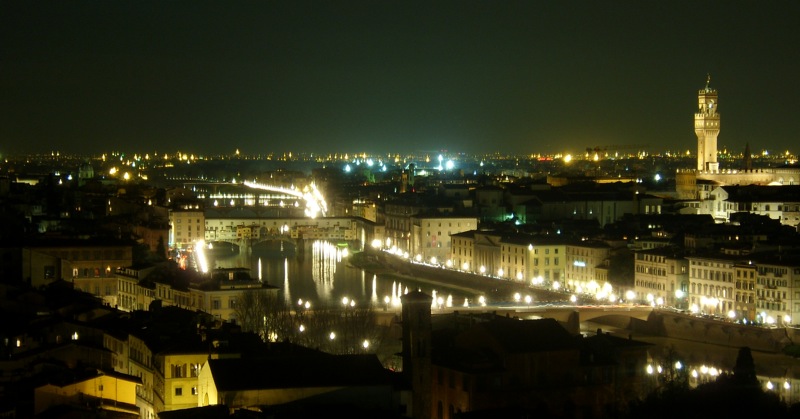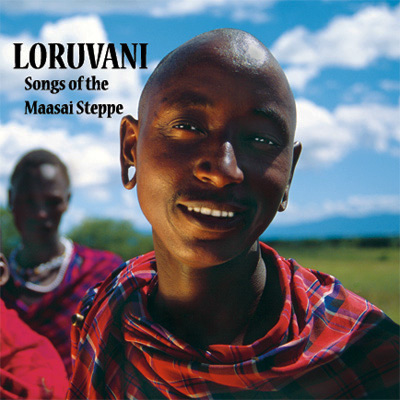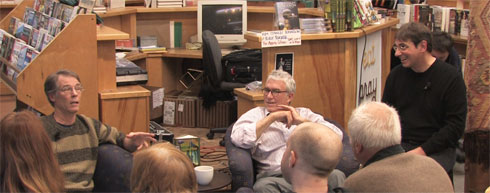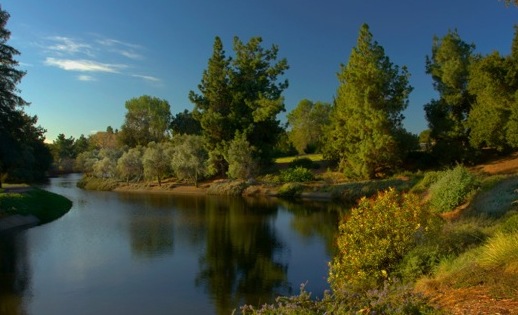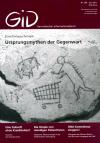Recently, a few days of holidays brought me to Firenze, better known as Florence, in Tuscany, Italy. It is well known to be a city full of art and history, however this touristic title does not prepare you for the wealth and beauty to be found in every street, in every carved door, in every Renaissance building. Or you might just find the Catholic imagery too repetitious. In Galileo's time, Florence was also famous for its lenses and optics!
If we're talking about it here, it's because Florence is famous for having hosted Galileo Galilei during the greater part of his life, as seen in Galileo's Dream. Galileo is everywhere in Florence; statues and busts of him and other famous Florentines are abound. The statue on the right is from the loggia of the Uffizi Gallery.
~
Galileo was born in adjacent Pisa, which was also part of the Duchy of Florence, and received his education in the Florence region. At age 28 he moved out to Padua. He returned 18 years later, in 1610, when his observations with his telescope earned him a patronage by the Medici, the great ruling family of Florence.
"In Florence, Galileo had hastily rented a house that was a bit too near the Arno, but it had a little roof terrace for his night viewing, what the Venetians called an altana, and he figured he could find a more suitable establishment later." -- Galileo's Dream, Ch.IV
The Arno runs through Florence and many narrow bridges cross it in the city centre. The old shops on Ponte Vecchio have been kept, like shops on bridges that existed in Paris, although they no longer trade meat but expensive jewels.
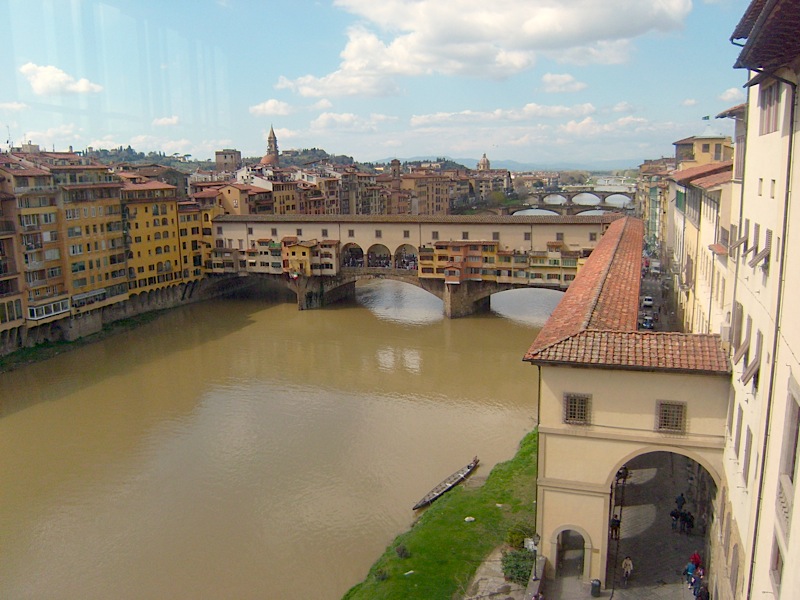
Next to Ponte Vecchio is the Uffizi Gallery, the Palazzo Vecchio, the Piazza della Signoria with its many statues -- all of them from the Medici period immediately before Galileo's time -- out on the open air, giving the place a magnificent otherworldly feeling. Below, Giambologna's "Rape of the Sabine Women".

Adjacent to the Uffizi Gallery (left) is the Institute and Museum of the History of Science (right), known since its renovation in 2010 as Museo Galileo. Galileo's original telescope and manuscripts are there! Far from covering only Galileo, through objects collected by the Medici and the Lorense, the museum traces centuries of scientific discoveries and evolution in scientific instruments. No pictures allowed.
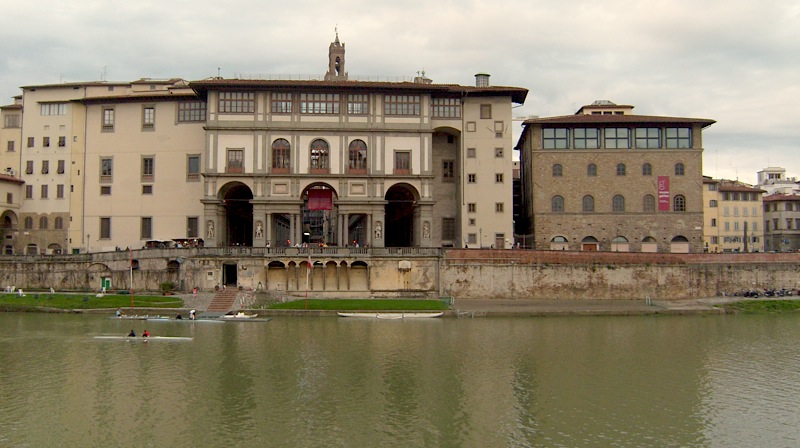
In 1617, Galileo moved to the Villa di Bellosguardo (known as Villa dell'Ombrellino since 1815). He lived there till 1631.
"On its hill, with a good prospect down onto the city, one could sit and rest, and observe the valley of tile rooftops and the great Duomo that appeared to sail east in the midst of a fleet." -- Galileo's Dream, Ch.X
Indeed, the view to Florence is wonderful.
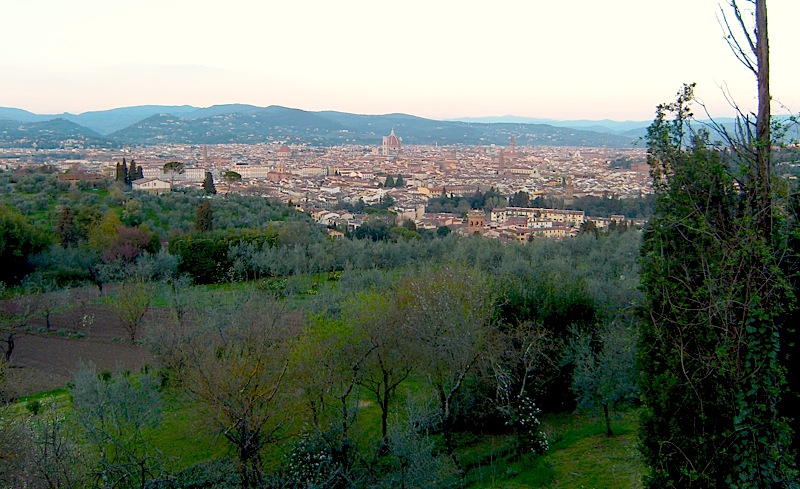
Approaching Bellosguardo, one can see the mix of urban and rural, typical of many italian cities. Right next to a dense urban centre, hillsides are still cultivated. The Bellosguardo villa can be seen on the hilltop.
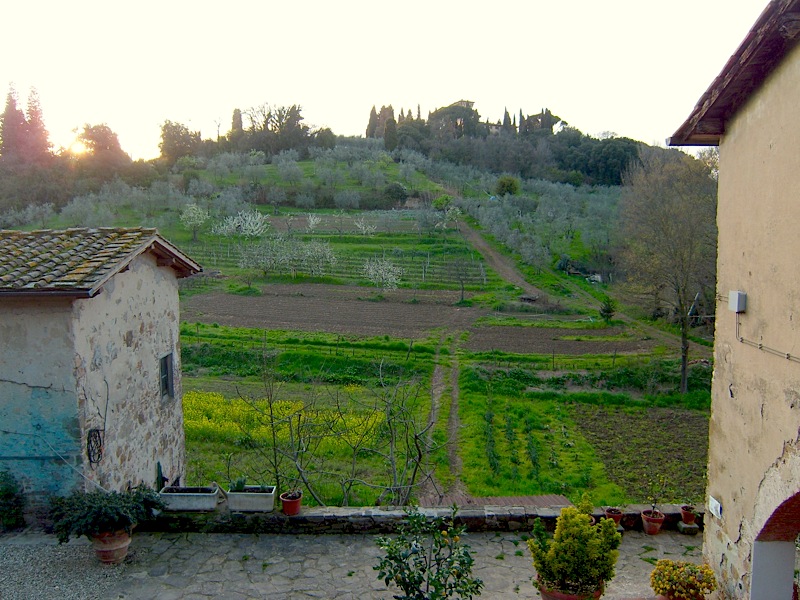
The villa was host to many other historical figures, such as James Fenimore Cooper and Ugo Foscolo. The villa itself, presently a hotel and events centre, is closed to the public.
In 1631, Galileo moved to Arcetri, now a suburb of Florence, at the time a different village altogether, in the hills west of the city. He was to be confined there till the end of his life.
"While he was gone, Maria Celeste had found a suitable villa for rent in Arcetri, called Il Gioiello, the Jewel. The rent was only thirty-five scudi a year, much less than Bellosguardo's hundred, because it was so much smaller, and in a less convenient location. [...] Galileo was particularly happy with the new house. From his bedroom window on the second floor he could look down the lane and see the corner of the convent of San Matteo. He could visit every day, and he did." -- Galileo's Dream, Ch.XV
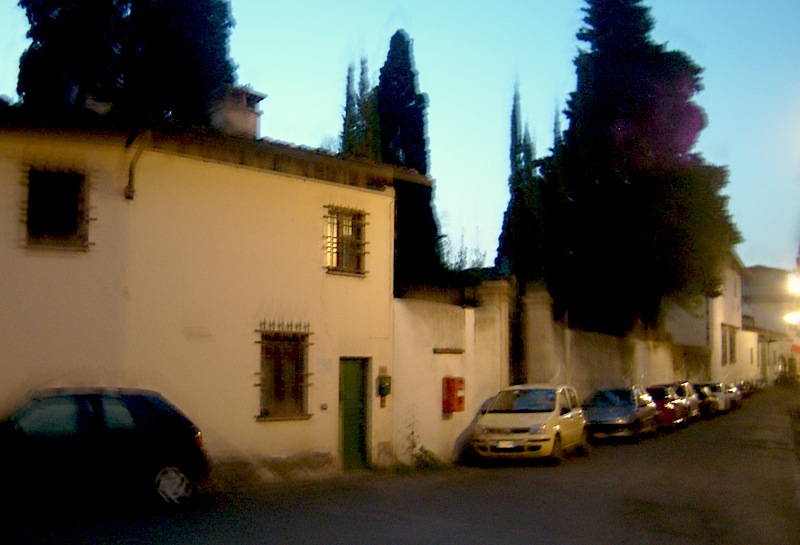
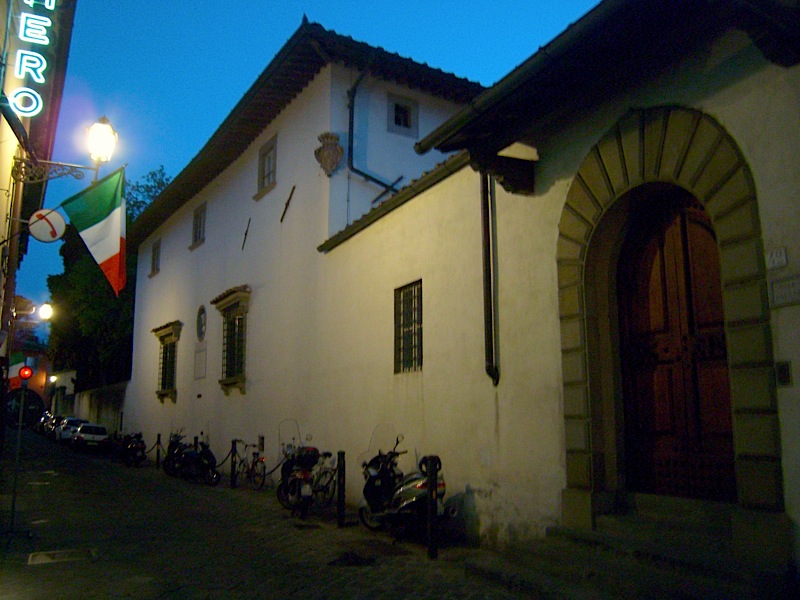
These views are from the street; on its front side, the villa is complete with a garden and a hillside view. The convent of San Matteo, where Galileo's two daughters were, is literally around the corner. The convent has since been rebuilt and no original buildings survive. "Il Gioello" is inaccessible because it still is a private property (!) but a visit can be obtained with the municipality, it seems. In 1872, an observatory was built in Arcetri, because of the clear view and because of the symbolic proximity to "the Jewel".
Siena is only some 70km from Florence towards Rome. Travellers would stop there on their way to the powerful city. After his trial in 1633, Galileo stayed there at the hall of an ex-student of his, Ascanio Piccolomini. Siena, in the middle of a wine-producing region, exhibits that same mixture of urban and rural as many parts of Tuscany.
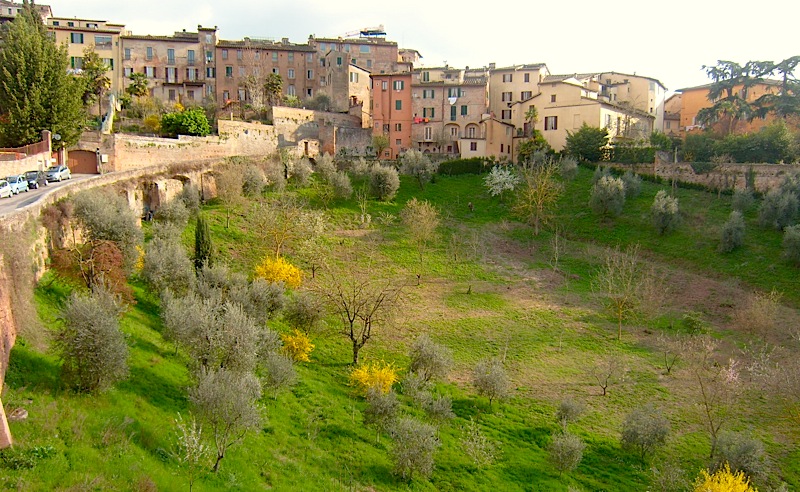
In Florence, closer to the Arno, is a house presently called Casa di Galileo, complete with portraits of him and his daughters on it, although Galileo himself lived there for a very short time in the last years of his life, when he had to go to Florence to be visited by doctors. His son Vincenzo and his family lived there.
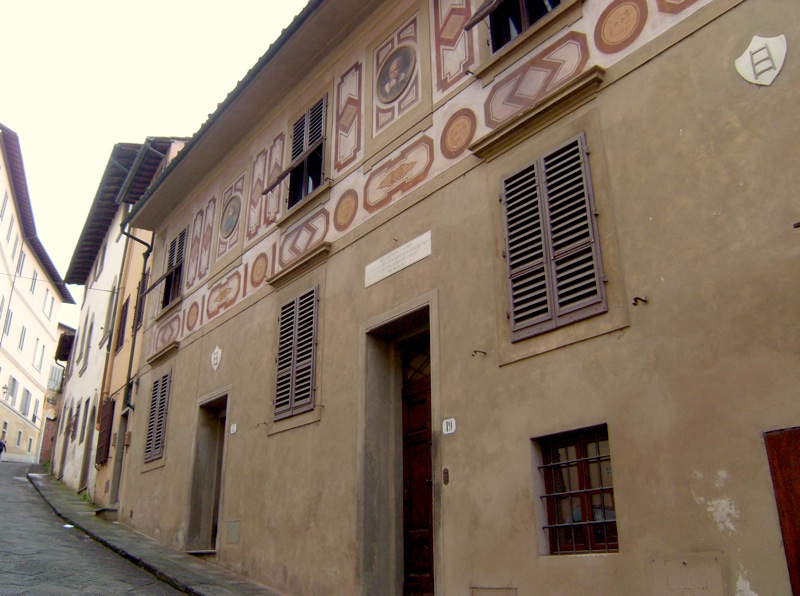
Galileo died in 1642 in his house in Arcetri. He was buried in the church of Santa Croce, which hosts the remains or dedications to many other famous Florentines, such as Dante, Macchiavelli, Michelangelo, Marconi, Fermi...
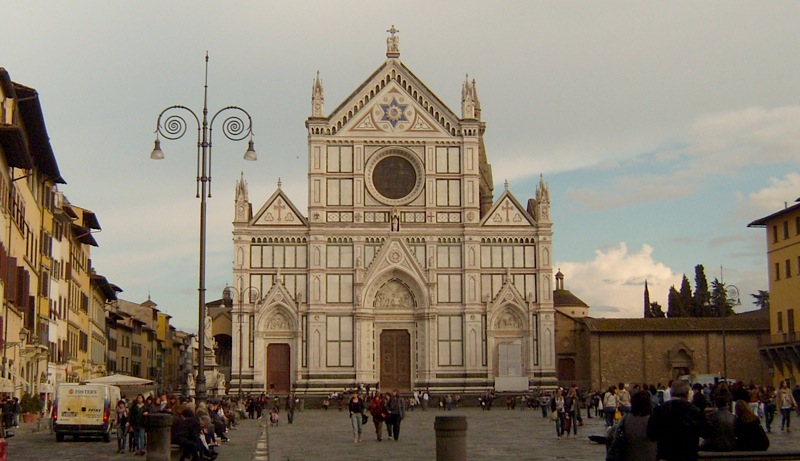
Galileo's tomb was erected in 1737 with funds of his disciple Vinenzo Viviani, also buried there (so is Galileo's daughter Maria Celeste, though this is not mentioned).
"He paid for the design of a monument, to be located in San Croce across from the tomb of the great Michelangelo; their tombs would then make a matched pair, Art and Science together holding up the Church." -- Galileo's Dream, Ch.XX
Galileo's tomb is bordered by two female statues, representing Astronomy and Geometry.

Across from him is indeed Michelangelo.

There is a huge number of text and photographic material around Galileo and Florence available on the internet. These photos are personal, but I'm sure more and better can be found. There are also other Galileo-related sights in Florence too: Villa delle Selve (his friend Saliviati's villa); the church of Santa Maria del Carmine (where his mother lived and is buried); Villa of Marignolle (a Medici villa where he was often a guest); churches where friars denunciated Galileo's work; Florence's National Library (with the biggest collection of Galileo manuscripts)... It's nice browsing through this material, and other artwork from the period, to immerse oneself in the period. See these itineraries here; the Italian version is fuller; the Museo Galileo (with a virtual museum for those who can't make it) and its Galileo Portal (with a big photo gallery and Galileo's works in scanned format).
"I want to know everything!" -- Galileo's Dream, Ch.IX
